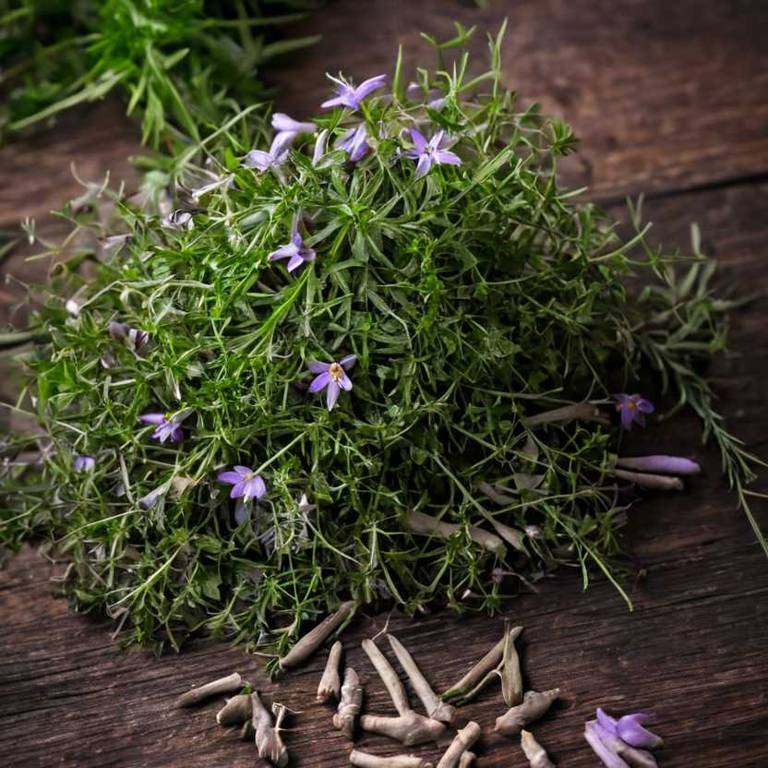10 Best Erythraea Centaurium Health Benefits

Erythraea centaurium, commonly known as red centaury, is a medicinal plant that has been traditionally used for its various health benefits.
It is rich in bioactive compounds such as flavonoids, tannins, and alkaloids, which contribute to its therapeutic properties. This plant is known to support digestive health by soothing gastrointestinal inflammation and promoting healthy digestion. Additionally, it has been used to alleviate symptoms of urinary tract infections due to its antimicrobial and anti-inflammatory effects.
Erythraea centaurium also exhibits antioxidant properties that help in neutralizing free radicals, thereby supporting overall cellular health and reducing oxidative stress in the body.
1. Boosts immunity
Erythraea centaurium boosts immunity by enhancing the body's natural defense mechanisms through its rich content of bioactive compounds.
These compounds, including flavonoids and polysaccharides, have been shown to stimulate the production of immune cells such as macrophages and lymphocytes. The herb also supports the function of the immune system by reducing oxidative stress and inflammation, which can weaken immune responses. Regular consumption of Erythraea centaurium may help the body better fight off infections and diseases.
Its immune-boosting properties make it a valuable natural remedy for maintaining overall health and wellness.
2. Reduces inflammation
Erythraea centaurium reduces inflammation by containing bioactive compounds that inhibit pro-inflammatory pathways in the body.
These compounds, such as flavonoids and phenolic acids, help modulate the immune response and decrease the production of inflammatory cytokines. Its anti-inflammatory properties make it beneficial for conditions like arthritis, skin disorders, and gastrointestinal inflammation. The plant's ability to reduce inflammation is supported by both traditional use and modern scientific research.
Incorporating Erythraea centaurium into dietary or herbal formulations may offer natural support for managing chronic inflammatory diseases.
3. Improves digestion
Erythraea centaurium improves digestion by stimulating the production of digestive enzymes in the gastrointestinal tract.
This enhanced enzymatic activity helps break down food more efficiently, reducing the likelihood of indigestion and bloating. The plant’s natural compounds also support gut health by promoting a balanced microbiome. As a result, individuals may experience improved nutrient absorption and overall digestive comfort.
Its traditional use in herbal medicine further underscores its effectiveness in supporting digestive wellness.
4. Supports liver health
Erythraea centaurium supports liver health by promoting the detoxification processes within the liver.
This herb contains bioactive compounds that may help protect liver cells from damage caused by toxins and oxidative stress. It is believed to enhance the liver's ability to regenerate and maintain its optimal function. The plant's antioxidant properties contribute to reducing inflammation and supporting overall hepatic wellness.
As a result, Erythraea centaurium is often considered a natural remedy for maintaining a healthy liver.
5. Enhances circulation
Erythraea centaurium enhances circulation by stimulating the cardiovascular system and improving the flow of blood throughout the body.
Its active compounds, such as flavonoids and saponins, help dilate blood vessels, reducing resistance to blood flow and promoting better oxygen delivery to tissues. This improved circulation can aid in reducing swelling, fatigue, and other symptoms associated with poor blood flow. Additionally, it may support the health of the circulatory system by strengthening capillaries and improving overall vascular function.
As a result, Erythraea centaurium is often used in traditional medicine to promote vitality and enhance physical performance.
6. Promotes skin health
Erythraea centaurium promotes skin health by providing essential nutrients that support the skin's natural regeneration process.
It contains antioxidants that help neutralize free radicals, reducing oxidative stress and preventing premature aging. The herb also has anti-inflammatory properties that can soothe irritated skin and reduce redness. Its ability to enhance collagen production contributes to improved skin elasticity and a more youthful appearance.
Regular use of Erythraea centaurium in skincare routines can lead to a healthier, more radiant complexion.
7. Aids in detoxification
Erythraea centaurium aids in detoxification by supporting the body's natural processes for eliminating harmful substances.
It contains bioactive compounds that enhance liver function, which is crucial for metabolizing toxins. This herb may help neutralize free radicals and reduce oxidative stress, promoting overall cellular health. Its detoxifying properties are believed to aid in the removal of heavy metals and other environmental pollutants from the body.
Regular use of Erythraea centaurium may contribute to improved metabolic efficiency and long-term health maintenance.
8. Improves mental clarity
Erythraea centaurium improves mental clarity by enhancing cognitive function and promoting focus.
This herb is believed to support brain health through its rich content of antioxidants and essential nutrients. Regular consumption may help reduce mental fatigue and improve concentration, making it beneficial for individuals seeking mental sharpness. Its traditional use in herbal medicine highlights its potential role in supporting mental alertness.
Overall, Erythraea centaurium offers a natural approach to boosting mental clarity and cognitive performance.
9. Supports heart health
Erythraea centaurium supports heart health by promoting cardiovascular function through its bioactive compounds.
This plant contains flavonoids and polyphenols that help reduce oxidative stress and inflammation, both of which are linked to heart disease. These compounds may also help regulate blood pressure and improve circulation, contributing to overall cardiovascular wellness. Additionally, Erythraea centaurium has been traditionally used in herbal medicine for its ability to strengthen the heart muscle.
Its potential role in maintaining a healthy heart makes it a valuable natural remedy for those seeking to support cardiac health.
10. Boosts energy levels
Erythraea centaurium boosts energy levels by enhancing metabolic efficiency and promoting cellular vitality.
This unique plant contains bioactive compounds that support the body's natural energy production processes. Its ability to stimulate mitochondrial function helps in converting nutrients into usable energy more effectively. As a result, individuals may experience increased stamina and reduced fatigue during physical or mental activities.
Incorporating Erythraea centaurium into one's routine can be a natural way to maintain consistent energy throughout the day.